
Early word on what happened today during the U.S. Supreme Court's hearing on the crucial Section 5 of the Voting Rights Act in Shelby County, AL v. Eric Holder is not encouraging. This could come to be seen as a very dark day for voting rights in this country, as a landmark provision of the 1965 Voting Rights Act may be on the verge of being dismantled and, arguably, a half a decade of civil rights advancements along with it.
Late last night we detailed what's at stake and how the activist Supremes are likely to intercede in what is clearly a Congressional duty, as specifically ascribed to them in the 15th Amendment of the U.S. Constitution. That, despite a stunning 98 to 0 vote in the U.S. Senate to re-authorize the VRA for another 25 years as is, after 21 hearings and some 15,000 pages of documentation on the continuing blight of racial discrimination, as recently as 2006.
While it's always a perilous exercise to try and read the tea leaves from a SCOTUS hearing, The Nation's Ari Berman, who was present in the court room this morning, Tweets, disturbingly today: "In oral argument, Scalia likened Congressional support for Voting Rights Act to a 'perpetuation of racial entitlement'". He went on to indicate his "quick reaction" to the hearing was that, that while the five Republican Justices are "skeptical of Sec 5," there is a "small chance Kennedy can still be persuaded." He notes, that, incredibly, "Voter suppression attempts in [the] last election didn't even come up during SCOTUS arguments about Voting Rights Act".
Because the Supreme Court still operates in the 1800s, there was no live audio or video of today's hearing. The transcript, however, should be made available later today [Update: transcript is now linked at the bottom of this article] and audio will be made available on Friday.
For now, NBC reports today's hearings this way:
NBC’s Pete Williams reported after the oral argument, "I think it’s a safe prediction to say that the Voting Rights Act, as it now stands, is not going to survive. The question is: how far will the Supreme Court go in striking parts of it down?"
Williams said what seemed to concern a majority of the justices was "the fact that the law is too backward looking."
...
Williams reported that during the one hour-and-15 minute oral argument, Justice Anthony Kennedy said that the post-World War II Marshall Plan to rebuild Europe "was a good thing at one time, but times change."
New York Times' Adam Liptak described today's hearing in more, if similarly disturbing detail this way...
Justice Antonin Scalia called the provision, which requires nine states, mostly in the South, to get federal permission before changing voting procedures, a "perpetuation of racial entitlement." Chief Justice John G. Roberts Jr. asked a skeptical question about whether people in the South are more racist than those in the North. Justice Anthony M. Kennedy asked how much longer Alabama must live "under the trusteeship of the United States government."
The court's more liberal members, citing data and history, said Congress remained entitled to make the judgment that the provision was still needed in the covered jurisdictions.
...
The law, a landmark achievement of the civil rights era was challenged by Shelby County, Ala., which said that the requirement had outlived its usefulness and that it imposed an unwarranted badge of shame on the affected jurisdictions.
The county's lawyer, Bert W. Rein, said that the "problem to which the Voting Rights Act was addressed is solved."
...
Congress renewed the act in 2006 after holding extensive hearings on the persistence of racial discrimination at the polls, again extending the preclearance requirement for 25 years.
We'll update this item as needed throughout the day.
Also, please note that our friend and colleague, investigative reporter Greg Palast, has posted a petition calling for Section 5 of the Voting Rights to be extended, rather than killed, to require preclearance of new election laws in all states, rather than just the 16 covered jurisdictions currently specified in Section 5 of what he calls "Martin Luther King's Dream Act". You can sign that petition here.
UPDATE 11:32am PT: Lyle Denniston of SCOTUSblog sees a similar case made to those of the others reporting on the hearing, but finds a sliver of possible light in regard to Kennedy's "swing" role on an otheriwse clearly 4 to 4 divided court...
Naturally, that meant the potential swing vote would be held by Justice Kennedy.
Denniston then goes on to describe how Kennedy seemed to "perk up" during arguments made by Justices Kagan and Sotomayor that, even if the formula used to determine which jurisdictions are covered by Section 5, that Alabama, and thus, Shelby County, would still be among those jurisdictions. If so, the argument that seemed to catch Kennedy's interest went, Shelby was the wrong plaintiff to bring this case, since they can't argue that they are being harmed by the current formula.
"If you would be covered under any formula, why are you injured under this one?," Kennedy asked Shelby's attorney who reportedly refused to agree with the premise of the question.
Denniston continues:
He wanted to be assured that the Voting Rights Act might not be enforceable at all, if Section 5 were to be nullified. He commented that the other enforcement provision — Section 2, which applies nationwide — was not an adequate substitute.
So, there's a bit --- a very small bit --- of hope that Kennedy may end up siding with the court's liberal wing on this one.
Tom Goldstein, however, also at SCOTUSblog, saw it this way:
UPDATE 11:55am PT: LA Times' David G. Savage and David Lauter describe Scalia's controversial remark this way:
As we described in our coverage last night, this is exactly the "kind of question you can leave to Congress." In fact, the 15th Amendment, which bars the denial of the vote "by the United States or by any State on account of race, color, or previous condition of servitude," specifically gives Congress the power to enforce that article of the Constitution as they have done (albeit 95 years later) with the passage of the Voting Rights Act.
Section 2 of the 15th Amendment reads plainly: "The Congress shall have power to enforce this article by appropriate legislation."
So, which part of that two-sentence Constitutional Amendment does Scalia --- who pretends to be a "strict constructionist" --- seem to have trouble understanding?!
UPDATE 12:43pm PT: The complete transcript of today's hearing is now posted here [PDF].
• See our earlier coverage of what's at stake in today's hearing right here...


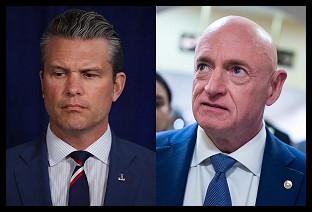 Court Blocks Hegseth Censure of Sen. Mark Kelly
Court Blocks Hegseth Censure of Sen. Mark Kelly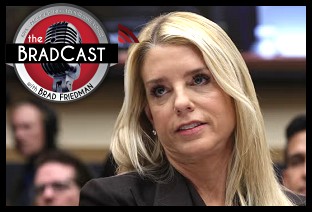 Harpy Tantrums, Legal Losses, Election Fails, Retreating ICE and Other Hopeful Signs: 'BradCast' 2/12/26
Harpy Tantrums, Legal Losses, Election Fails, Retreating ICE and Other Hopeful Signs: 'BradCast' 2/12/26 'Green News Report' 2/12/26
'Green News Report' 2/12/26
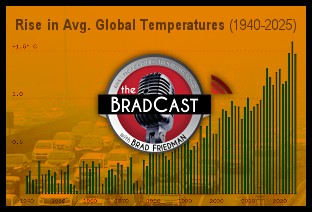 'Let Kids with Asthma Suffer': Trump to Reverse EPA's Landmark 'Endangerment Finding': 'BradCast' 2/11/26
'Let Kids with Asthma Suffer': Trump to Reverse EPA's Landmark 'Endangerment Finding': 'BradCast' 2/11/26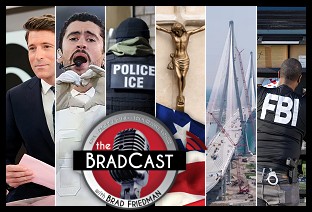 Trump's Presidency Now About Little More Than Racism, Corruption, Culture War Nonsense: 'BradCast' 2/10/26
Trump's Presidency Now About Little More Than Racism, Corruption, Culture War Nonsense: 'BradCast' 2/10/26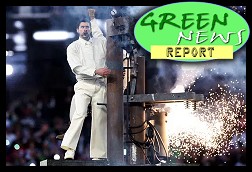 'Green News Report' 2/10/26
'Green News Report' 2/10/26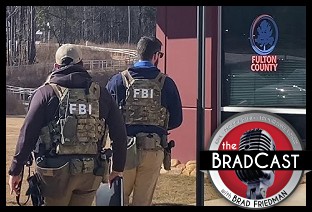 About Trump's FBI Raid of the Fulton County, GA Elections Warehouse: 'BradCast' 2/9/26
About Trump's FBI Raid of the Fulton County, GA Elections Warehouse: 'BradCast' 2/9/26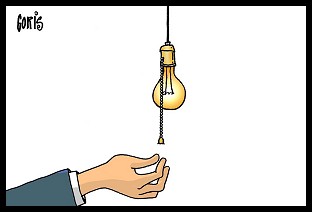 Sunday 'Dead in Darkness' Toons
Sunday 'Dead in Darkness' Toons 'New START' Treaty Allowed to End Amid New World Disorder: 'BradCast' 2/5/26
'New START' Treaty Allowed to End Amid New World Disorder: 'BradCast' 2/5/26 'Green News Report' 2/5/26
'Green News Report' 2/5/26 Trump Turns 'War on Terror' Tools Against Domestic Political Foes: 'BradCast' 2/4/26
Trump Turns 'War on Terror' Tools Against Domestic Political Foes: 'BradCast' 2/4/26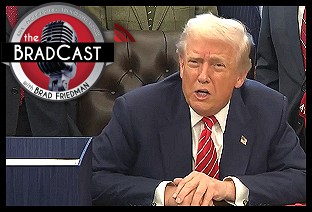 Losing Legally and Politically, Trump Threatens to 'Nationalize' Elections: 'BradCast' 2/3/26
Losing Legally and Politically, Trump Threatens to 'Nationalize' Elections: 'BradCast' 2/3/26 'Green News Report' 2/3/26
'Green News Report' 2/3/26 Bad and Good Bunnies, and an Electoral Shock in Deep 'Red' TX: 'BradCast' 2/2/26
Bad and Good Bunnies, and an Electoral Shock in Deep 'Red' TX: 'BradCast' 2/2/26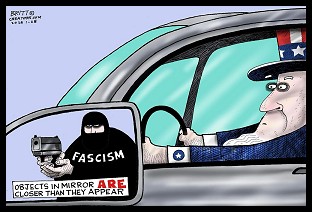 Sunday 'Mirror, Mirror' Toons
Sunday 'Mirror, Mirror' Toons 'Green News Report' 1/29/26
'Green News Report' 1/29/26 It's About Elections and the Windmills of His Mind: 'BradCast' 1/29/26
It's About Elections and the Windmills of His Mind: 'BradCast' 1/29/26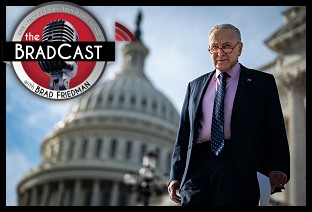 Govt Shutdown Over ICE Funding Near Certain This Weekend: 'BradCast' 1/28/26
Govt Shutdown Over ICE Funding Near Certain This Weekend: 'BradCast' 1/28/26 Trump Blinks, Bovino Out, MN Op Falters, Persists as Midterms Loom: 'BradCast' 1/27
Trump Blinks, Bovino Out, MN Op Falters, Persists as Midterms Loom: 'BradCast' 1/27  The ICE Murder of ICU Nurse Alex Pretti and the Heroes of Mpls: 'BradCast' 1/26/26
The ICE Murder of ICU Nurse Alex Pretti and the Heroes of Mpls: 'BradCast' 1/26/26  The BRAD BLOG: 22 Years and Still Counting
The BRAD BLOG: 22 Years and Still Counting Mr. Smith Testifies (Publicly) in Washington: 'BradCast' 1/22/26
Mr. Smith Testifies (Publicly) in Washington: 'BradCast' 1/22/26 World Turning Against Self-Destructing U.S. Under Trump: 'BradCast' 1/21/26
World Turning Against Self-Destructing U.S. Under Trump: 'BradCast' 1/21/26 Trump Waste, Fraud, Abuse on Voting, at DOJ, by DOGE: 'BradCast' 1/20/26
Trump Waste, Fraud, Abuse on Voting, at DOJ, by DOGE: 'BradCast' 1/20/26
 VA GOP VOTER REG FRAUDSTER OFF HOOK
VA GOP VOTER REG FRAUDSTER OFF HOOK Criminal GOP Voter Registration Fraud Probe Expanding in VA
Criminal GOP Voter Registration Fraud Probe Expanding in VA DOJ PROBE SOUGHT AFTER VA ARREST
DOJ PROBE SOUGHT AFTER VA ARREST Arrest in VA: GOP Voter Reg Scandal Widens
Arrest in VA: GOP Voter Reg Scandal Widens ALL TOGETHER: ROVE, SPROUL, KOCHS, RNC
ALL TOGETHER: ROVE, SPROUL, KOCHS, RNC LATimes: RNC's 'Fired' Sproul Working for Repubs in 'as Many as 30 States'
LATimes: RNC's 'Fired' Sproul Working for Repubs in 'as Many as 30 States' 'Fired' Sproul Group 'Cloned', Still Working for Republicans in At Least 10 States
'Fired' Sproul Group 'Cloned', Still Working for Republicans in At Least 10 States FINALLY: FOX ON GOP REG FRAUD SCANDAL
FINALLY: FOX ON GOP REG FRAUD SCANDAL COLORADO FOLLOWS FLORIDA WITH GOP CRIMINAL INVESTIGATION
COLORADO FOLLOWS FLORIDA WITH GOP CRIMINAL INVESTIGATION CRIMINAL PROBE LAUNCHED INTO GOP VOTER REGISTRATION FRAUD SCANDAL IN FL
CRIMINAL PROBE LAUNCHED INTO GOP VOTER REGISTRATION FRAUD SCANDAL IN FL Brad Breaks PA Photo ID & GOP Registration Fraud Scandal News on Hartmann TV
Brad Breaks PA Photo ID & GOP Registration Fraud Scandal News on Hartmann TV  CAUGHT ON TAPE: COORDINATED NATIONWIDE GOP VOTER REG SCAM
CAUGHT ON TAPE: COORDINATED NATIONWIDE GOP VOTER REG SCAM CRIMINAL ELECTION FRAUD COMPLAINT FILED AGAINST GOP 'FRAUD' FIRM
CRIMINAL ELECTION FRAUD COMPLAINT FILED AGAINST GOP 'FRAUD' FIRM RICK SCOTT GETS ROLLED IN GOP REGISTRATION FRAUD SCANDAL
RICK SCOTT GETS ROLLED IN GOP REGISTRATION FRAUD SCANDAL VIDEO: Brad Breaks GOP Reg Fraud Scandal on Hartmann TV
VIDEO: Brad Breaks GOP Reg Fraud Scandal on Hartmann TV RNC FIRES NATIONAL VOTER REGISTRATION FIRM FOR FRAUD
RNC FIRES NATIONAL VOTER REGISTRATION FIRM FOR FRAUD EXCLUSIVE: Intvw w/ FL Official Who First Discovered GOP Reg Fraud
EXCLUSIVE: Intvw w/ FL Official Who First Discovered GOP Reg Fraud GOP REGISTRATION FRAUD FOUND IN FL
GOP REGISTRATION FRAUD FOUND IN FL

































